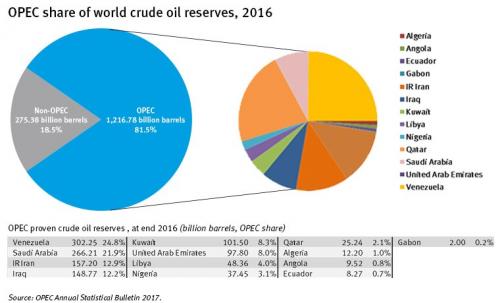Foreign interests and agents in Venezuela
Venezuela is subjected to the economic interests and geopolitical plans of the three global powers: the United States, China and Russia.
- Opinión

There is a high risk that a national political problem might be resolved through military intervention and that this could trigger an international problem in South America. Venezuela is at the centre of the playing-board, with a political problem of representation and legitimacy, an economic crisis and covert intervention. At the same time, it is subjected to the economic interests and geopolitical plans of the three global powers: the United States, China and Russia. The geographically bizarre entrance of Colombia into NATO was completed on May 18, 2017 after agreeing to develop an individual program of cooperation and establishing priority areas of work. The scenario of conflict could not be worse, for either Venezuela or South America.
Venezuela
After the election of the Constituent Assembly, on July 30, the contaminated political environment of Venezuela and the blurred image of what is happening in that country, in the face of an infinite number of articles, opinions, analysis and propaganda published on the issue, hinders a precise understanding of the economic causes of the present crisis, its causes and the real risks. Venezuela is, by far, one of the most important geopolitical nations of the continent. It lies at the head of the Caribbean Basin and possesses strategic reserves of petroleum, water, copper, forests and rare metals. It has a political and economic importance proportionally greater than its of regional production, which in 2015, was 7.1% of the GDP of Latin America. It has the largest reserve of petroleum of the world and, in addition, is the main exporter of petroleum of the Western hemisphere (see the graphic).
Oil production has been nationalized through the para-state company PDVSA that owns the CITGO oil company in the United States. This represents one of the eight biggest refinery companies in the US market and the sixth company in distribution of gasoline.
Since 2005, PDVSA is promoting significant projects and infrastructure for Petrocaribe in the Caribbean Basin. The company exports oil to Caribbean countries at a price that is paid in cash and long-term credit following the pattern of the San José Treaty.
PDVSA and ROSNEFT
Last April, PDVSA acquired a loan of 2 billion dollars from the Russian state petroleum company ROSNEFT, with a mortgage of 49.9% on the CITGO Company. In the case of non-fulfilment, ROSNEFT would have a near majority control of CITGO. This puts Russia on the Venezuelan playing-board and that of the Caribbean Basin.
According to Republican Congressman Duncan, “Russia could become the second largest foreign owner of US refining capacity”. Venezuelan exile Roger Santodomingo, of the Center for the Development of Democracy in the Americas[1], claims that “the Russians don’t want to be stuck with CITGO and are trying to substitute this collateral for control over Venezuelan oilfields.” Both scenarios are complicated as they put Russia either within the US or in the Caribbean Basin.
The possible reprisals of Washington against Venezuela for holding elections for a constituent assembly without a majority vote of the population, could have a “potential impact on oil shipments to the United States, for which Venezuela is the third largest oil supplier after Canada and Saudi Arabia”[2].
The military scene
Negotiations are underway between Russia and Nicaragua, Cuba and Venezuela, to establish naval bases, according to the Russian defence minister Shoigu[3]. Meanwhile, the committee of foreign affairs of the Capitol proposed the Nicaragua law[4] to put pressure on the Central American country for its support of Venezuela and Cuba. It is a way to “clean house” of adverse regimes. Previously it was Honduras, Paraguay, Argentina and Brazil. Now Venezuela is in the midst of contradictory interests between the US and Russia, as is occurring with Syria, Iraq, Libya and Qatar.
China is the new player that has increased its participation in the Venezuelan market between 2000 and 2015, when they went from 0.98% of the total of their imports and 0.069% of their exports to 14.1% and 14.5%. It is an important commercial petroleum partner, although its long term outlook is in strategic rare metals used for high technology equipment – such as cereus (Ce), dysprosium (Dy), erbium (Er), europium (Eu), gadolinium (Gd), holmium (Ho), lanthanum, among others – over which they have a virtual world monopoly.
Finally, the greatest danger is the substitution of US foreign policy for military power that is apparent in the priorities of the national budget and the strong military presence in the administration. It is not acceptable for the internal political problems of a country to be defined by the struggle between the three global powers. The principle of non-intervention needs to be restored.
08/08/2017.-
(Translated for ALAI by Jordan Bishop)
- Oscar Ugarteche is a researcher with IIEC-UNAM/SIN, coordinator of the Obela project.
- Armando Negrete is the Webmaster of the Obela project.
Del mismo autor
- El multilateralismo bipolar 08/03/2022
- Bipolar multilateralism 07/03/2022
- What does 2022 bring? Uncertainty 31/01/2022
- ¿Qué trae el 2022? Incertidumbre 31/01/2022
- The most expensive Christmas of the century... (so far) 20/01/2022
- La navidad más cara del siglo (hasta ahora) 20/01/2022
- Lo que pasó en el 2021 10/01/2022
- What happened in 2021 10/01/2022
- Estados Unidos: el elefante en la habitación 08/11/2021
- The elephant in the room 07/11/2021
Clasificado en
Guerra y Paz
- Prabir Purkayastha 08/04/2022
- Prabir Purkayastha 08/04/2022
- Adolfo Pérez Esquivel 06/04/2022
- Adolfo Pérez Esquivel 05/04/2022
- Vijay Prashad 04/04/2022
